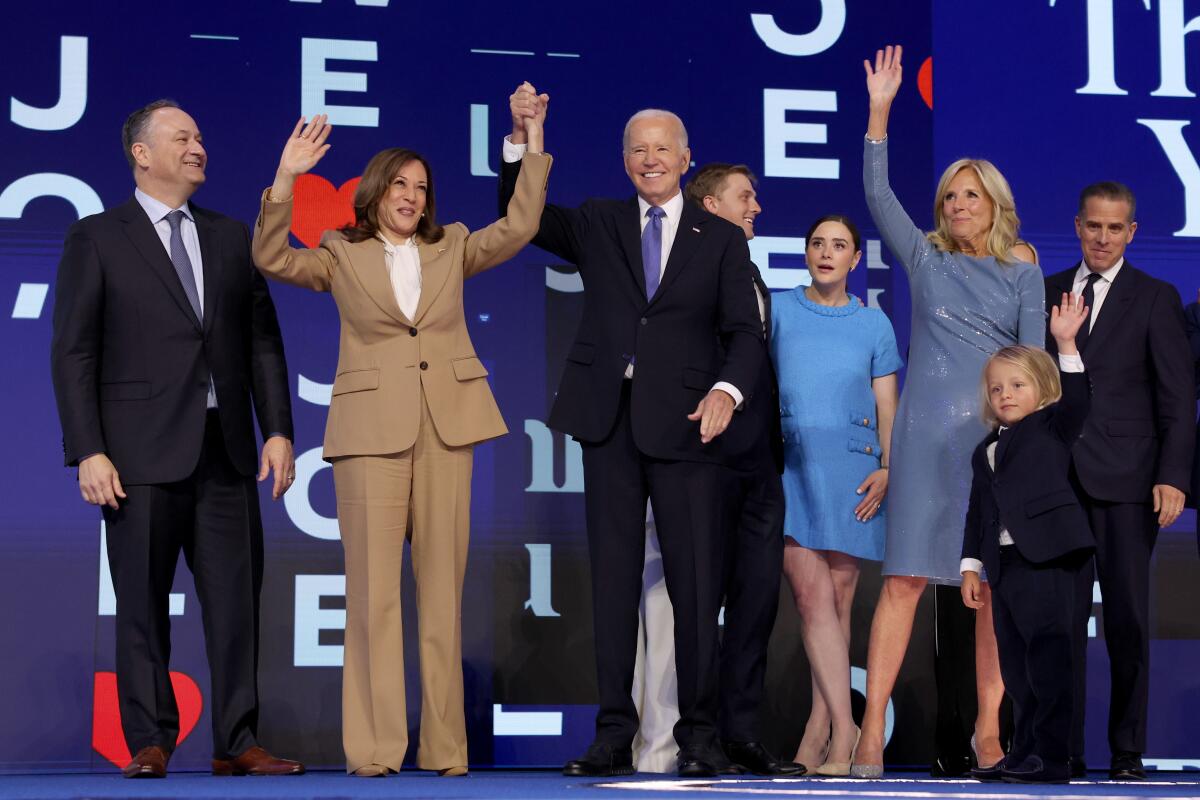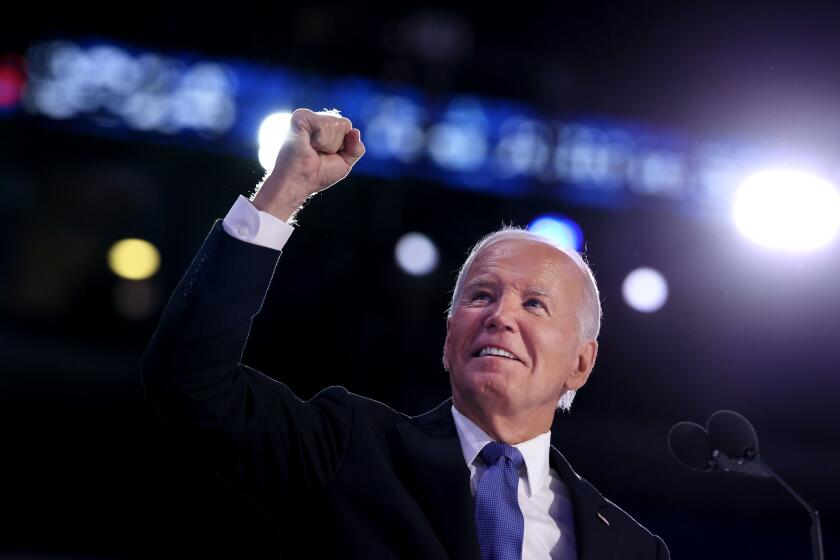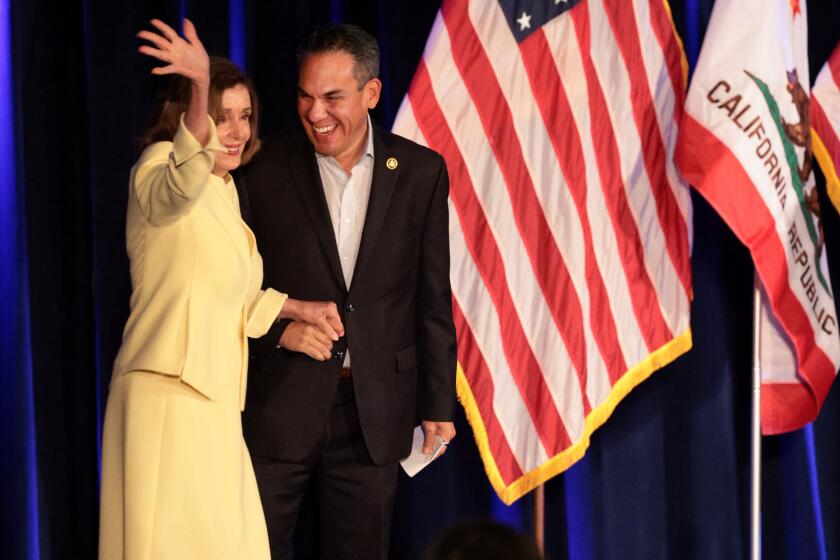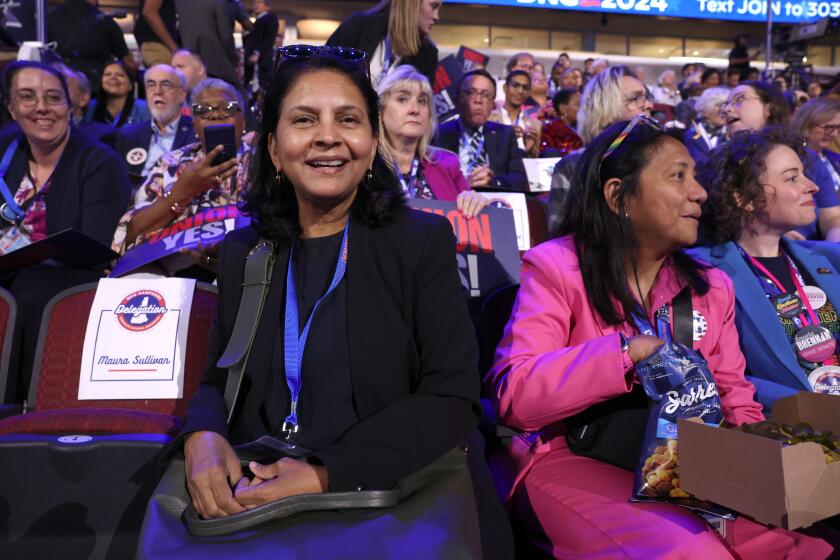Column: Biden shows what it means to make America great — and why Democrats are glad to bid him farewell

CHICAGO — The Democratic National Convention started off with hope, hype and smaller protests than some feared — and a surprise appearance from Kamala Harris, looking very demure, very mindful.
(That’s a TikTok thing, if you don’t know.)
The snark level, meantime, was sky-high as cheeky partisans projected onto Trump Tower — which loomed over downtown like a middle finger extended at Democrats — a set of taunting slogans along the lines of: “Trump-Vance ‘Weird As Hell.’ ”
That’s trolling on a 92-story scale.
There were a great many speeches and a great number of entertainers, representing Democratic constituencies from Hollywood to Nashville. (Yes, there are still some Southern Democrats.)
But, of course, Monday night belonged to Joe Biden, the president who reluctantly walked away from his reelection campaign and showed up just long enough to endorse Harris before making his poignant exit — long after much of the country had gone to bed.
Columnists Mark Z. Barabak and Anita Chabria laid off the deep-dish pizza so they could devote all their energies to the convention and came away with these thoughts:
Barabak: He came, he spoke and he showed why Democrats were glad to bid their party leader a heartfelt — but nevertheless relieved — farewell.
Biden has never been a great orator. His strength was knowing how to work the levers in Washington, and for just about 45 minutes Monday night the president outlined all he’d managed to accomplish in his lone term.
Simply stated, he said: “We’re building a better America.”
Biden, too, was mindful, making a point of wrapping Harris in the mantle of his successes. (And the last 3½ years have been filled with nothing but an unbroken series of triumphs, to hear the president tell it, but, hey, it’s a convention speech.)
President Biden speaks on opening night of the Democratic convention, along with 2016 nominee Hillary Clinton, before heading off for vacation in Santa Barbara County.
After he cited legislation bringing down the costs of some prescription drugs, the crowd chanted, “Thank you, Joe!”
“Thank you, Kamala, too!” he interjected.
The emotions were genuine.
Biden was greeted with a lusty ovation lasting more than 4½ minutes, by far the longest of the night. He pulled a white hankie from his breast pocket and dabbed away a tear after a prolonged embrace from his daughter, Ashley, who delivered a loving introduction.
It was moving to hear Biden discuss the long arc of his career — from too young to serve in the Senate (he was 29 when first elected and turned the required age of 30 shortly before being sworn in) to being too old to serve another term as president, as he finally acknowledged.
It was also a reminder of why Democrats collectively looked to November’s election with heart-in-their-throats anxiety — and that was even before Biden’s crashingly awful debate performance.
On Monday night he appeared every bit his 81 years. He was stiff, occasionally stumbling over his words. His waxen face was frozen in a perpetual scowl. He shouted out his words, not at all the joyful warrior of Harris-Walz fashion, but more like a cranky old man shooing kids off his lawn.
The contrast with Harris, who bounded onstage afterward to embrace Biden and join him in the traditional arms-raised tableau, couldn’t have been more stark.
There was speculation that convention programmers purposely pushed the president’s appearance out of television’s prime time on the East Coast and, by the time he finished, in the Central time zone. Of course, party officials denied it, saying the program ran long because speakers were just so darned popular, people wouldn’t stop cheering and clapping.
What did you think about Biden’s speech?
Pelosi and Biden go back decades, but when it comes to elections, the former House speaker has never had much use for sentimentality.
Chabria: The emotions were genuine, as you say, but I think they were also complex.
Nancy Pelosi had tears in her eyes, though many claim she was a key architect of Biden’s exit. When Harris went onstage she told Biden — not for the cameras — that she loved him.
Ashley Biden brought up the spirit of her departed brother, Beau, and at the end, Biden walked offstage with a young grandson, named in that son’s honor.
When the crowd chanted, “Thank you, Joe,” Biden seemed resigned, but also a bit defiant with the long list of accomplishments he touted — reminding us how much he’s done that seems forgotten in the scrum of the election.
Until a few weeks ago, this was a proud and stubborn man who believed not only that he was the best person for the presidency, but believed we thought so, too. So Monday night — as much as it was billed as a gratitude-driven sendoff — was also a forced retirement for a guy who does know more about government and governance than half of Congress combined.
My takeaway is that for all his flaws, and we all have them, this is a man of duty and honor.
Biden quoted a line from the song “American Anthem” to sum up why he made the choice to step away from power: “What shall our legacy be, what will our children say? Let me know in my heart when my days are through, America, America, I gave my best to you,” he said.
And there’s no doubt he gave his best, for decades.
But, as Hillary Clinton said in an earlier speech, change is afoot. And that change doesn’t include Biden.
Barabak: It was a forward-looking Clinton appearance, yes. But the might-have-been vibe was strong when the former first lady and secretary of State took the stage.
The ovation lasted nearly a minute and a half, as Clinton repeatedly started and stopped over the prolonged clapping and cheers.
She acknowledged the outgoing incumbent — “first, let’s salute President Biden” — then dwelled at length on the history-making nature of Harris’ candidacy.
“Something is happening in America,” said Clinton, who was the first woman to win a major party’s presidential nomination. “Something we’ve waited for and dreamed of for a long time.”
More than 66 million Americans voted for her in 2016, Clinton noted, poking more than 66 million small holes in the glass ceiling that’s kept a woman from the Oval Office.
She then tore with relish into the man who beat her — not in the popular vote but narrowly in the electoral college.
“Kamala Harris” — a former district attorney and California’s attorney general— “prosecuted murderers and drug traffickers. Donald Trump fell asleep at his own trial,” Clinton gibed. “And when he woke up, he made his own kind of history” as the first ex-president convicted of a felony.
“Lock him up!” the crowd chanted, and Clinton smiled.
Anita, you were taken with one of the non-celebrity speakers, weren’t you?
Chabria: I really felt what April Varrett said, and what she represented.
Varrett, the first Black woman to lead the Service Employees International Union, came out of California as the former head of SEIU Local 2015, the state’s largest local union representing long-term care workers.
Its rank-and-file consists of many Black and brown women, a number of whom are immigrants struggling with poverty in an industry as necessary as it is underfunded. Varrett promised to create a labor movement that is “younger, darker, hipper, fresher, sneaker-wearing.”
That is a powerful vision that is already happening in both labor and politics. I think in a little-noticed way, this convention is all about immigration and communities of color — the immigrants who fuel our economy, fight for their communities and now are claiming political power in a way that terrifies conservatives to the point they demonize them.
Comparing the crowd at the Republican National Convention with the one in Chicago is startling. It really feels like two different Americas, and a crossroads election where we decide which one we believe in.
I was also struck by the everyday Americans who spoke about abortion access. Hadley Duvall, a Kentuckian who was raped and impregnated by her stepfather when she was 12, floored the room with a single question.
Trump calls abortion bans a “beautiful thing,” she said. “What is so beautiful about a child having to carry her parent’s child?”
What else stood out to you?
Barabak: How several of the night’s speakers, in addition to Clinton, leaned into the historic nature of Harris’ nomination as the first Black woman and first Asian American to lead a major party presidential ticket.
That was a major theme in 2020, when Harris first ran for president, and it seemed at times that campaign was more about her hopes of making history than what voters had on their minds.
Immigrants and American-born sons and daughters of India and its neighbors have raised lots of money, and fervor, for the Democratic presidential nominee. Kamala Harris is big news in India, too
But there’s no denying the precedent-shattering nature of Harris’ nomination, and it was celebrated with the right amount of balance and perspective.
The vice president was placed in a long line of pioneering women who helped tear down race and gender barriers, among them Diane Nash, Rosa Parks, Fannie Lou Hamer, Coretta Scott King and Shirley Chisholm.
“We must all understand that Black history is American history,” said Derrick Johnson, president of the NAACP. “And in this historic moment, we will write the next chapter together.”
That remains to be seen, depending on what happens in November. But there is no doubt the moment inscribed in Chicago stands apart from all that have preceded.
More to Read
Get the L.A. Times Politics newsletter
Deeply reported insights into legislation, politics and policy from Sacramento, Washington and beyond. In your inbox three times per week.
You may occasionally receive promotional content from the Los Angeles Times.















